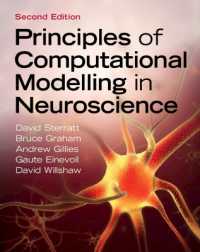Full Description
The Sin of Writing and the Rise of Modern Hebrew Literature contends that the processes of enlightenment, modernization, and secularization in nineteenth-century Eastern European Jewish society were marked not by a reading revolution but rather by a writing revolution, that is, by a revolutionary change in this society's attitude toward writing. Combining socio-cultural history and literary studies and drawing on a large corpus of autobiographies, memoirs, and literary works of the period, the book sets out to explain the curious absence of writing skills and Hebrew grammar from the curriculum of the traditional Jewish education system in Eastern Europe. It shows that traditional Jewish society maintained a conspicuously oral literacy culture, colored by fears of writing and suspicions toward publication. It is against this background that the young yeshiva students undergoing enlightenment started to "sin by writing," turning writing and publication in Hebrew into the cornerstone of their constitution as autonomous, enlightened, male Jewish subjects, and setting the foundations for the rise of modern Hebrew literature.
Contents
1. Introduction.- 2. Literacy: Theory, Methodology, Ethnography.- 3. Reading without Writing and the Myth of Universal Literacy in Nineteenth-Century Eastern European Jewish Society.- 4. The Primacy of Speech over Writing in Hasidic Society.- 5. The Primacy of Speech over Writing in Mintagdic Society.- 6. The Written Torah and the Oral Torah: Class, Gender, and the Cultural Images of the Corpora.- 7. Intentional Ignorance of the Hebrew Language.- 8. From Mother Tongue to Father Tongue: The Study of Grammar, Reading, and Writing in Hebrew as a Male Maskilic Rite of Passage.- 9. "I Made Myself a Notebook of Blank Paper": The Sin of Writing and the Constitution of the Subject.- 10. Epilogue: Writing, Tradition, and Modernity in Only for the Lord Alone by S. Y. Agnon.








